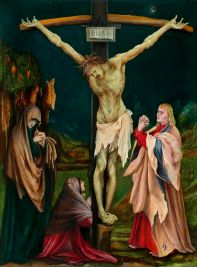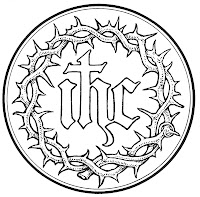EXODUS 15:1-11
THE LORD HAS TRIUMPHED GLORIOUSLY.
M: Alleluia! Christ is risen!
Cong: He is risen indeed! Alleluia!
In the name + of Jesus.
One of the great criticisms lodged against Christianity by unbelievers is that our God is bloodthirsty, violent, and murderous. He destroyed the world population in the Flood (save Noah and his family), he ordered the slaughter of the Canaanite nations, and he commanded that Israel stone its adulterers, psychics, and false prophets. The argument concludes, “If that is what your God is like, then I want no part of him!” The Old Testament lesson for Easter Sunday seems to reinforce that argument. Not only did the Lord act violently in slaying the Egyptian army, the Israelites took up instruments and sang rousing songs of praise about it.
Then Moses and the people of Israel sang this song to the LORD, saying, “I will sing to the LORD, for he has triumphed gloriously; the horse and his rider he has thrown into the sea.” (Exodus 15:1)
There is no need to downplay what the Lord has done. Yes, this was a violent battle and, in fact, a massacre. The Egyptian army was utterly wiped out. The nation of Israel sustained no fatalities or even wounds. There is no need to be embarrassed about or to apologize for what the Lord has done. Our Lord is a bloodthirsty God, and he acts violently as he slays his enemies. But if you want to be saved, then it has to be this way. The Lord has triumphed gloriously; his victory is absolute and undisputed.
The Lord's violence against Pharaoh and his army came not because God had an intense hatred for those particular people, but because he has a fierce loyalty and love for his promises. God had promised the children of Abraham, Isaac, and Jacob that salvation would come through them. God promised to establish them in the Promised Land and to preserve them until the Savior came. The Egyptians, however, had other plans for the children of Israel. They were cheap labor for building up Pharaoh's empire. They often had to be coaxed by whips and beatings, but they would be forced to build up store cities for the glory of Pharaoh and Egypt. At the Passover, God delivered his people out of Egypt. As the Egyptians were mourning the people the Lord had slain and were occupied with burying their dead, they begged the Israelites to leave. But then they had a change of heart. So, Pharaoh ordered the greatest army on earth to pursue the Israelites.
The Egyptians were not going to ask politely for Israel's return or to negotiate a labor contract. They were not going to play nice.
“The enemy said, ‘I will pursue, I will overtake, I will divide the spoil, my desire shall have its fill of them. I will draw my sword; my hand shall destroy them.’” (Exodus 15:9) This was a bloodthirsty enemy, devoted to acts of violence and murder. They sought to defeat and destroy God's people. Whoever would not be slaughtered by Egyptian swords would be captive to the Egyptian empire and assumed into Egyptian culture. It would not just be the loss of a nation, but the end of God's promise. But the Lord is fiercely loyal to his promise. He is fervently dedicated to having a Savior come for mankind. To attack the promise is to attack the Lord. So the Lord acted decisively for the salvation of mankind. He destroyed those who would threaten his promise.
“Pharaoh's chariots and his host he cast into the sea, and his chosen officers were sunk in the Red Sea. The floods covered them; they went down into the depths like a stone. Your right hand, O LORD , glorious in power, your right hand, O LORD, shatters the enemy.” (Exodus 15:4-6) Do not be embarrassed by this or apologize for it. The Lord has triumphed gloriously. He has defended his promise and upheld the salvation of mankind. If you want to be saved, this is the way it has to be.
Our songs today are even more robust than what the Israelites sang after the death of Pharaoh's army. Today, we sing praise to God for his crushing defeat of much more dangerous enemies. The Lord Jesus Christ has conquered death. The Lord Jesus Christ has put an end to sin. The Lord Jesus Christ has crushed the head of Satan underfoot. For many people, Easter is about powder-puff bunnies, fuzzy chicks, creamy chocolate, and frilly dresses. Make no mistake: Easter is celebrated where a bloody, violent battle has concluded. In this battle, one side would be utterly victorious, the other side deadly defeated. It was winner take all, leaving behind no survivors. Either life wins, or death wins. The Lord Jesus has triumphed gloriously. Only Jesus came out alive. Indeed, it was a massacre. If you want to be saved, then it has to be this way. The Lord has triumphed gloriously; his victory is absolute and undisputed.
If you want your praises to ring out, if your songs will be robust, if you will have joy that you have a bloodthirsty, violent, murderous God, you have to recognize your enemies—sin, death, and the devil—for what they are. Every one of us entered this world enslaved to sin. If you don't think you are, then try being holy this week. You won't be. You can't. You are a sinner, and you can't fight your way free. Being a sinner also means that you will die. You can try to fight off death, but you won't avoid the grave. You can't. And when you die, you will be judged for your life. God will only be pleased with lives that are good, pure, and holy. That is who God is, so that is his standard. And here, the devil reveals himself as your great enemy. For, he entices you to do whatever sins please you, and then he accuses you and buries you with guilt and damns you for the very things he convinced you were good. Sin is not polite with you. It condemns you. Death does not negotiate with you. It seizes everyone. The devil does not play nice and he never will. These are bloodthirsty, violent, and murderous enemies who drag their captives down to hell for everlasting torment, and no one can escape them. There is no outrunning them, no outsmarting them, and no overcoming them.
If you want to be rescued from your enemies and delivered from their deadly grip, then they must be killed off. No treaties. No friendly agree-to-disagree arrangements. Not even a cease fire. They must be slain, never to rise again. So, for us fights the Valiant One whom God himself elected. God took on our flesh in order to deliver our flesh from sin, death, and the devil. Jesus stormed the very center of the enemy lines to deliver us out of our captivity to our enemies. The enemies drew blood and inflicted wounds on Jesus. Your bloodthirsty God poured out his blood for you. He let Satan do his worst, and Satan delivered the death blow to Jesus. Jesus willingly threw our sins upon himself and threw himself into death for us. But on the third day, Jesus rose from the dead. By his resurrection, Jesus has left sin for dead. Because of Jesus' resurrection, death is now a corpse. By his resurrection, Jesus crushed Satan crushed under foot. It is a bloody, violent, and deadly battle in which Jesus has risen as the victor, and all your enemies lie slaughtered and massacred. Today, the sounds on the battlefield are robust songs of victory and praise. If you want to be saved, then it has to be this way. The Lord has triumphed gloriously; his victory is absolute and undisputed.
The Lord Jesus is risen from the dead. This man, Jesus, has rescued you from all your enemies. Mankind has a victor over sin, death, and the devil. He has conquered. He has destroyed. He proclaims freedom to the captives and leads you out of captivity into a kingdom of life, light, and grace. The Lord Jesus has triumphed gloriously, and you are the spoils of the war—not to be his prisoners, but to be his brothers and sisters and fellow heirs of heaven. Rejoice! For your enemies are dead. Jesus lives and reigns and makes you victors in a war that you did not even have to fight.
The Lord has triumphed gloriously. The violent battle has ended with a glorious peace. And to show you that you are included in Jesus' victory and receive his benefits, you are baptized into Christ. Just as the enemies of Israel were drowned in the waters of the Red Sea, so your enemies were drowned in the waters of baptism. For, this is what the Lord says:
“Baptism … now saves you, not as a removal of dirt from the body but as an appeal to God for a good conscience, through the resurrection of Jesus Christ.” (1 Peter 3:21) In your baptism, you have been freed from your enemies. For, baptism connects you to Jesus who saves you. Your enemies have been killed—violently and definitively slain by the Lord lives and reigns forever. He lives and reigns for you, and you shall now live and reign forever with him. For, the Lord has triumphed gloriously.
Therefore, let your hymns of praise be sung out with gusto and gratitude. Do not be embarrassed by our Lord's bloody battle or apologize for his violent slaughter of your enemies. If you want to be saved, it has to be this way. The Lord has triumphed gloriously; his victory is absolute and undisputed. So, we paraphrase the song of Moses and rejoice in our Easter victory:
“I will sing to the LORD , for he has triumphed gloriously; sin, death, and the devil he has drowned in the waters. The LORD is my strength and my song, and he has become my salvation; this is my God, and I will praise him, my father's God, and I will exalt him. The LORD is a man of war; the LORD is his name.” (Exodus 15:1-3, paraphrase)
In the name of the Father and of the Son + and of the Holy Spirit. Amen.

















 Today, O good Jesus,
Today, O good Jesus,






